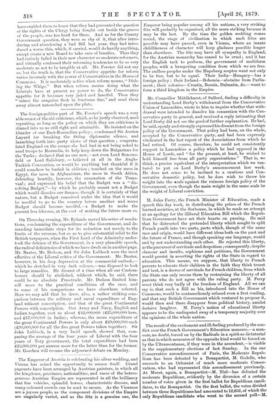On Thursday evening, Mr. Rylands moved his series of resolu-
tions, condemning the expenditure of the Government, and de- manding immediate steps for its reduction not merely to the limits of the revenue, but so as to give substantial relief to the British taxpayers, when the First Lord of the Admiralty under- took the defence of the Government, in a very plausible speech, the radical deficiencies of which we have dwelt on in another page. Mr. Baxter, Mr. Dodson, and Sir John Lubbock were the most effective of the Liberal critics of the Government. Mr. Baxter, however, in his deep depression at the commercial outlook,— which he sketched in very dark colours,—was disposed to look to large remedies. He dreamt of a time when all our Custom- houses should be abolished, without which, he said, there could be no absolute Free-trade. Mr. Dodson limited him- self more to the practical conditions of the case, and to some of his comparisons we have elsewhere referred. Here we may add that he drew, also, a rather striking com- parison between the military and naval expenditure of Eng- land without conscription, and that of the great Continental Powers with conscription. Our Army and Navy, English and Indian together, cost us about £12,000,000 (D25,000,000 here, and £17,000,000 in India) ; whereas, the mean expenditure of the great Continental Powers is only about £20,000,000 each (290,000,000 for all the five great Powers taken together). Sir John Lubbock, in a very lucid speech, showed that, com- paring the average of the four years of Liberal with the four years of Tory government, the total expenditure had been £10,000,000 per annum more for the latter than for the former. Mr. Goschen will resume the adjourned debate on Monday.


































 Previous page
Previous page